中国传统乐器英文介绍讲解学习
中国古代音乐乐器介绍英语作文
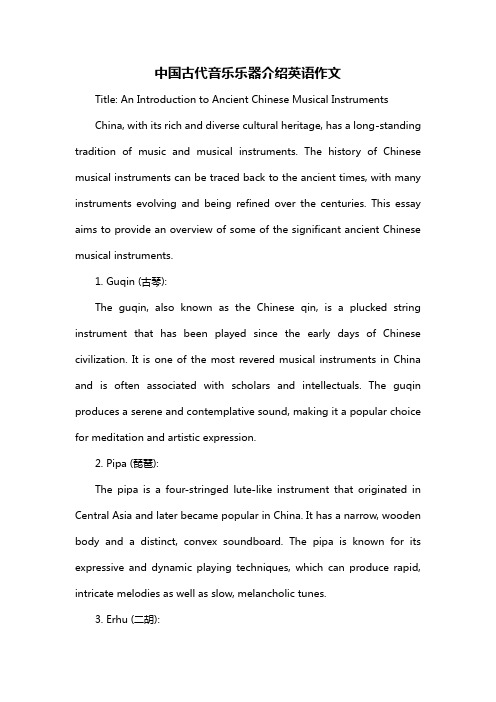
中国古代音乐乐器介绍英语作文Title: An Introduction to Ancient Chinese Musical InstrumentsChina, with its rich and diverse cultural heritage, has a long-standing tradition of music and musical instruments. The history of Chinese musical instruments can be traced back to the ancient times, with many instruments evolving and being refined over the centuries. This essay aims to provide an overview of some of the significant ancient Chinese musical instruments.1. Guqin (古琴):The guqin, also known as the Chinese qin, is a plucked string instrument that has been played since the early days of Chinese civilization. It is one of the most revered musical instruments in China and is often associated with scholars and intellectuals. The guqin produces a serene and contemplative sound, making it a popular choice for meditation and artistic expression.2. Pipa (琵琶):The pipa is a four-stringed lute-like instrument that originated in Central Asia and later became popular in China. It has a narrow, wooden body and a distinct, convex soundboard. The pipa is known for its expressive and dynamic playing techniques, which can produce rapid, intricate melodies as well as slow, melancholic tunes.3. Erhu (二胡):The erhu is a two-stringed bowed instrument that is widely used in Chinese traditional music. It is known for its soul-stirring sound and remarkable expressive range. The erhu's body is typically made of wood, and the strings are traditionally made of silk. The instrument is played by holding it vertically and using a bow to create sound by rubbing the strings.4. Dizi (笛子):The dizi is a Chinese transverse flute made of bamboo. It is a popular instrument in both folk and classical music, known for its pure and penetrating tone. The dizi has a range of over two octaves and can produce various articulations and effects, including tremolo and bending notes.5. Xun (埙):The xun is an ancient Chinese wind instrument made of pottery or bone. It belongs to the family of ocarinas and is known for its distinct, mellow sound. The xun has a spherical shape with finger holes on its surface, allowing the player to produce different pitches by covering or uncovering the holes.6. Gongs and Drums (锣鼓):Gongs and drums have played a significant role in Chinese music, particularly in ceremonial and festive contexts. Chinese gongs, known as luó, are struck with a mallet to produce a resonant, metallic sound.Drums, such as the dabo and the pangu, provide rhythmic accompaniment and add a dynamic energy to performances.In conclusion, ancient Chinese musical instruments represent a rich tapestry of cultural heritage and artistic expression. From the serene guqin to the dynamic pipa and the soulful erhu, these instruments have captivated audiences for centuries. They continue to be celebrated for their unique sounds and contributions to the world of music.。
中国传统乐器英文介绍演示教学
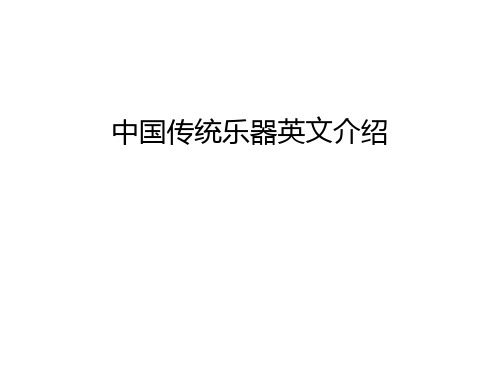
Wind Instruments (吹管乐器)
Sheng 笙
Di/Chinese Bamboo Flute 笛
ease of learning, portability and inexpensiveness It is a unique solo instrument and also be used in wind band
Chinese zither(guzheng)
Chinese zither has existed since the Warring States Period(戰國時期) and became especially popular during the Qin dynasty. The ancient guzheng had 12 strings, which gradually evolved into it current forms
.
String Instruments (拉弦乐器 )
Erhu /Chinese Fiddle 二胡
Banhu 板胡
Gentle , sorrowful
Bright ,painful NhomakorabeaGehu 革胡
中国传统乐器英文
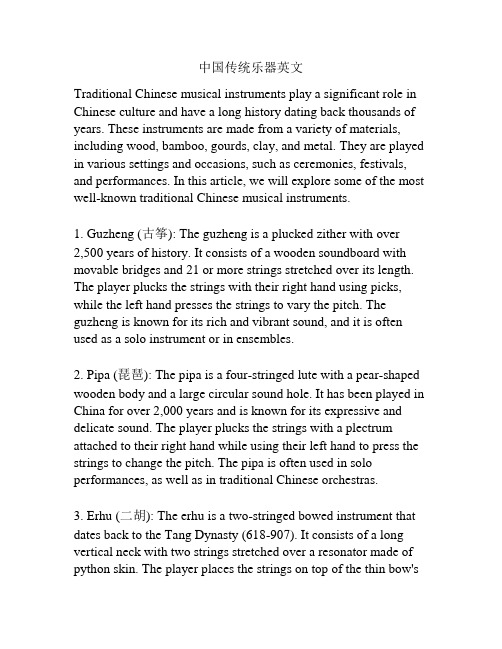
中国传统乐器英文Traditional Chinese musical instruments play a significant role in Chinese culture and have a long history dating back thousands of years. These instruments are made from a variety of materials, including wood, bamboo, gourds, clay, and metal. They are played in various settings and occasions, such as ceremonies, festivals, and performances. In this article, we will explore some of the most well-known traditional Chinese musical instruments.1. Guzheng (古筝): The guzheng is a plucked zither with over 2,500 years of history. It consists of a wooden soundboard with movable bridges and 21 or more strings stretched over its length. The player plucks the strings with their right hand using picks, while the left hand presses the strings to vary the pitch. The guzheng is known for its rich and vibrant sound, and it is often used as a solo instrument or in ensembles.2. Pipa (琵琶): The pipa is a four-stringed lute with a pear-shaped wooden body and a large circular sound hole. It has been played in China for over 2,000 years and is known for its expressive and delicate sound. The player plucks the strings with a plectrum attached to their right hand while using their left hand to press the strings to change the pitch. The pipa is often used in solo performances, as well as in traditional Chinese orchestras.3. Erhu (二胡): The erhu is a two-stringed bowed instrument that dates back to the Tang Dynasty (618-907). It consists of a long vertical neck with two strings stretched over a resonator made of python skin. The player places the strings on top of the thin bow'shorsehair and bows them to create a sound. The erhu has a haunting and expressive sound and is often used to imitate the human voice. It is frequently played in folk music, as well as in other genres such as classical and contemporary music.4. Dizi (笛子): The dizi is a bamboo flute with six fingers holes and a blowhole. It has a history of over 2,000 years and is one of the oldest Chinese musical instruments. The player blows across the blowhole and covers and uncovers the finger holes to produce different pitches and tones. The dizi is known for its bright and versatile sound and is used in a wide range of musical genres, including traditional Chinese music, folk music, and contemporary music.5. Guqin (古琴): The guqin is a seven-stringed zither that has been played for over 3,000 years. It has a long and narrow wooden body with movable bridges and is played using the fingers of both hands. The guqin has a reputation as being one of the most refined and elegant Chinese musical instruments. It is traditionally associated with scholars, poets, and intellectuals and is often used for solo performances and in meditation and contemplation.These are just a few examples of the many traditional Chinese musical instruments. Each instrument has its own unique sound and playing techniques, and they collectively contribute to the rich and diverse musical traditions of China. They not only serve as an essential part of Chinese cultural heritage but also continue to inspire and influence contemporary music in China and around the world.。
中国民族乐器(英文版)

打击乐器 Percussion instruments
11 5
吹管乐器
AB CD
Wind instruments
3 2
2
4
6
笛与箫的区别:
Flute and the difference between the flute
❖ 横吹为笛,竖吹为箫。 ❖ 笛子横吹音量大,传得远,加上笛膜以后音色清脆,明亮,表现力
京 胡
二胡 erhu
高胡 GaoHu
Bowed instrument
jinghu
拉 弦 乐 器
板胡 BanHu
Harp stem
琴筒 Harp tube
二胡构造
琴 杆
Erhu structure
琴皮 Harp skin
One thousand jins line
弓子 changes
千 斤 线 琴 轴
原创力文档是网络服务平台方若您的权利被侵害侵权客服qq
中国民族乐器
China national Musical Instruments
──及乐曲欣赏 And music appreciation
常见乐器的类型
Common instrument types
吹管乐器 Wind instruments
拉弦乐器 Bowed instrument
琴码 Harp yards
Harp shaft
二胡、京胡、板胡、高胡的异同点:
Erhu, jinghu, BanHu, GaoHu of similarities and differences
❖ 相同点:都是两根弦,结构基本相同。 不同点:(音色与使用范围的区分) 二胡:音色最柔和,可演奏的曲目由南到北都有。 京胡:音色尖利,多用如京剧曲目伴奏或牌子曲演奏。 高胡:音色细腻,多演奏南方的音乐,比如广东音乐。 板胡:音色高亢坚硬,多演奏北方的音乐,比如东北 地区,陕北地区等。
中国乐器介绍英文作文
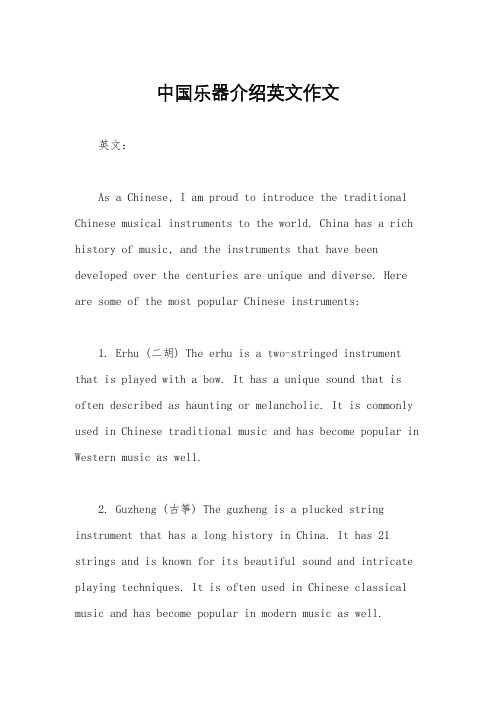
中国乐器介绍英文作文英文:As a Chinese, I am proud to introduce the traditional Chinese musical instruments to the world. China has a rich history of music, and the instruments that have been developed over the centuries are unique and diverse. Here are some of the most popular Chinese instruments:1. Erhu (二胡) The erhu is a two-stringed instrument that is played with a bow. It has a unique sound that is often described as haunting or melancholic. It is commonly used in Chinese traditional music and has become popular in Western music as well.2. Guzheng (古筝) The guzheng is a plucked string instrument that has a long history in China. It has 21 strings and is known for its beautiful sound and intricate playing techniques. It is often used in Chinese classical music and has become popular in modern music as well.3. Pipa (琵琶) The pipa is a four-stringed instrument that is played with a pick. It has a bright, crisp soundand is often used in Chinese traditional music. It has also been used in Western music, particularly in the works of composers such as Philip Glass.4. Dizi (笛子) The dizi is a bamboo flute that has been used in China for over 2,000 years. It has a unique sound that is often described as breathy or ethereal. It is commonly used in Chinese traditional music and has become popular in modern music as well.5. Sheng (笙) The sheng is a mouth-blown free reed instrument that has been used in China for over 3,000 years. It has a unique sound that is often described as warm and mellow. It is commonly used in Chinese traditional musicand has become popular in modern music as well.These are just a few examples of the many traditional Chinese instruments that are still popular today. Each instrument has its own unique sound and playing techniques,and they are all an important part of China's rich musical heritage.中文:作为一个中国人,我很自豪地向世界介绍中国传统乐器。
介绍中国古乐器的英文作文
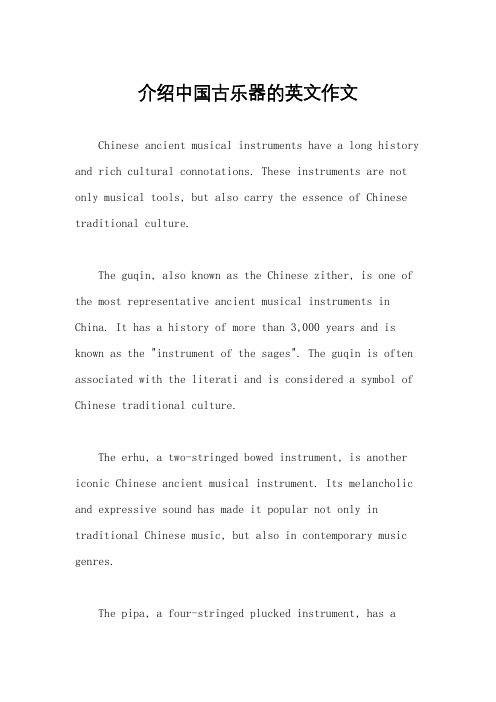
介绍中国古乐器的英文作文Chinese ancient musical instruments have a long history and rich cultural connotations. These instruments are not only musical tools, but also carry the essence of Chinese traditional culture.The guqin, also known as the Chinese zither, is one of the most representative ancient musical instruments in China. It has a history of more than 3,000 years and is known as the "instrument of the sages". The guqin is often associated with the literati and is considered a symbol of Chinese traditional culture.The erhu, a two-stringed bowed instrument, is another iconic Chinese ancient musical instrument. Its melancholic and expressive sound has made it popular not only in traditional Chinese music, but also in contemporary music genres.The pipa, a four-stringed plucked instrument, has ahistory of over 2,000 years. It is known for its virtuosic playing techniques and expressive qualities. The pipa has been widely used in both traditional and modern Chinese music.The dizi, or Chinese bamboo flute, is a simple yet versatile instrument. It has a unique sound that is often associated with pastoral and folk music. The dizi has been used in various Chinese musical genres, from classical to contemporary.The guzheng, a Chinese plucked zither, has a history of over 2,500 years. Its beautiful and resonant sound has made it a popular instrument in traditional Chinese music. The guzheng has also been adapted into contemporary music, showcasing its versatility.In conclusion, Chinese ancient musical instruments are not only a reflection of traditional Chinese culture, but also a source of inspiration for contemporary music. Their unique sounds and cultural significance continue to captivate audiences around the world.。
中国乐器介绍英文
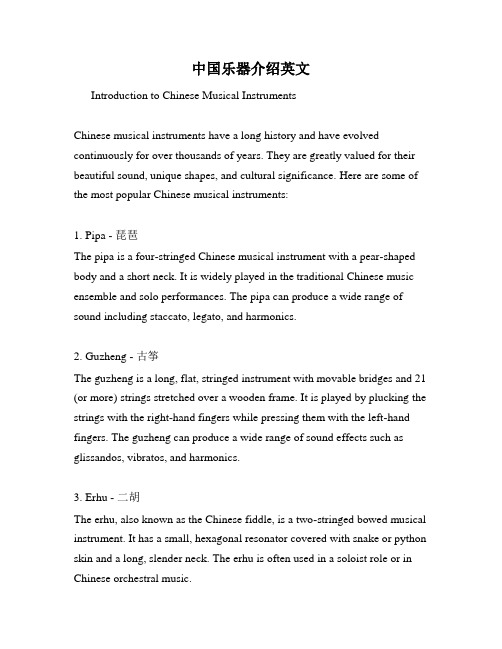
中国乐器介绍英文Introduction to Chinese Musical InstrumentsChinese musical instruments have a long history and have evolved continuously for over thousands of years. They are greatly valued for their beautiful sound, unique shapes, and cultural significance. Here are some of the most popular Chinese musical instruments:1. Pipa - 琵琶The pipa is a four-stringed Chinese musical instrument with a pear-shaped body and a short neck. It is widely played in the traditional Chinese music ensemble and solo performances. The pipa can produce a wide range of sound including staccato, legato, and harmonics.2. Guzheng - 古筝The guzheng is a long, flat, stringed instrument with movable bridges and 21 (or more) strings stretched over a wooden frame. It is played by plucking the strings with the right-hand fingers while pressing them with the left-hand fingers. The guzheng can produce a wide range of sound effects such as glissandos, vibratos, and harmonics.3. Erhu - 二胡The erhu, also known as the Chinese fiddle, is a two-stringed bowed musical instrument. It has a small, hexagonal resonator covered with snake or python skin and a long, slender neck. The erhu is often used in a soloist role or in Chinese orchestral music.4. Dizi - 笛子The dizi is a Chinese flute made of bamboo. It is a very versatile instrument and can be played solo, in ensemble with other Chinese instruments, or even in cross-cultural music. The dizi has a unique timbre and can produce a wide range of dynamic variations.5. Sheng - 笙The sheng is a mouth-blown and hand-held instrument consisting of a set of free-standing bamboo pipes. The tubes are connected to a central resounding chamber and can produce a range of pitch and timbre variation with different fingerings, air pressure, and embouchure techniques.6. Yangqin - 扬琴The yangqin is a Chinese hammered dulcimer consisting of a trapezoidal wooden body with metal strings stretched across. It is played by striking the strings with a pair of bamboo sticks. The yangqin is often used as an accompaniment instrument in traditional Chinese folk music and opera.7. Suona - 唢呐The suona is a type of Chinese horn, similar in shape to a trumpet, but with a distinctively loud and penetrating sound. It is often used in Chinese festivals and wedding ceremonies, as well as in traditional Chinese orchestral music.In conclusion, Chinese musical instruments are an essential part of the richcultural heritage of China. Each instrument has its own unique qualities that make it fascinating to hear and a pleasure to play.。
介绍中国乐器的英语短文
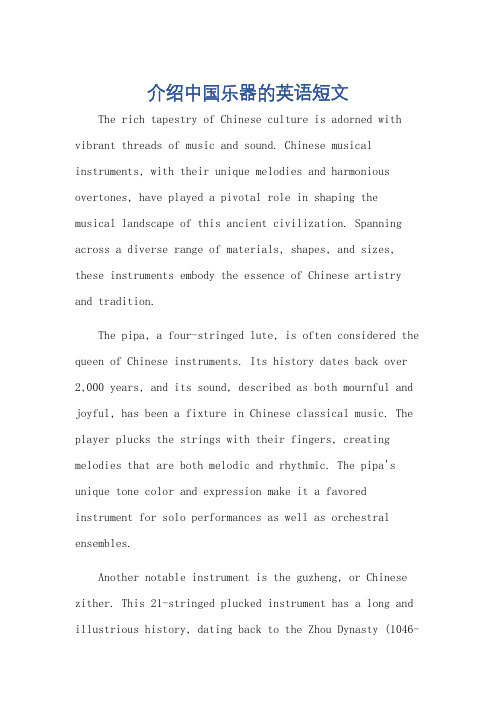
介绍中国乐器的英语短文The rich tapestry of Chinese culture is adorned with vibrant threads of music and sound. Chinese musical instruments, with their unique melodies and harmonious overtones, have played a pivotal role in shaping the musical landscape of this ancient civilization. Spanning across a diverse range of materials, shapes, and sizes, these instruments embody the essence of Chinese artistry and tradition.The pipa, a four-stringed lute, is often considered the queen of Chinese instruments. Its history dates back over 2,000 years, and its sound, described as both mournful and joyful, has been a fixture in Chinese classical music. The player plucks the strings with their fingers, creating melodies that are both melodic and rhythmic. The pipa's unique tone color and expression make it a favored instrument for solo performances as well as orchestral ensembles.Another notable instrument is the guzheng, or Chinese zither. This 21-stringed plucked instrument has a long and illustrious history, dating back to the Zhou Dynasty (1046-256 BC). The guzheng is renowned for its ability to evoke deep emotions, often described as the "voice of the ancients." Players use plectrums or their bare fingers to pluck the strings, producing sounds that range from softand melancholy to激昂慷慨.The dizi, a wind instrument made of bamboo, is also a popular choice among Chinese musicians. This flute-like instrument has a characteristic high-pitched sound thatcuts through the air, making it a popular choice foroutdoor performances. The dizi is often played in ensembles, complementing other instruments with its unique timbre and melody.The erhu, a one-stringed bowed instrument, is another iconic Chinese musical instrument. Its unique sound, produced by a bow drawn across the string, has adistinctive melancholy quality that is deeply evocative.The erhu is often played in traditional Chinese orchestras, providing a foundation for other instruments to build upon. These are just a few examples of the vast array of Chinese musical instruments that have withstood the test of time. Each instrument, with its unique sound and history,contributes to the rich tapestry of Chinese music,reflecting the depth and diversity of this ancient civilization. As one listens to the enchanting sounds of these instruments, one can almost hear the echoes ofhistory and culture resonating through the ages.**中国乐器的迷人之声**中国文化丰富多彩,音乐与声音在其中扮演着至关重要的角色。
中国古乐器英文介绍Ancient Chinese Musical Instruments

Chinese dulcimer (扬琴)
suona horn (唢呐)
Percussion Instrument
Chinese dulcimer (扬琴)
The yangqin was traditionally fitted with bronze strings, which gave the instrument a soft timbre. The instrument‘s strings are struck with two lightweight bamboo beaters with rubber tips (琴竹,富有弹性的竹制小棰). A professional musician often carries several sets of beaters, each of which draws a slightly different tone from the instrument, much like the drum sticks of Western percussionists.
The material of the instrument (Bayin)
Silk (丝)
Metal (金)
Bamboo (竹)
Clay (土)
Wood (木)
Gourd
(匏)
Stone (石)
Skin
(皮革)
士无故不撤琴瑟。 ——《礼记》
Pre-Qin period(711 bc-256 BC)
Practicability
Expressiveness
3 Inheritance
Inheritance
A-Play China (一奏器乐派)
Inheritance
介绍传统乐器的英语作文
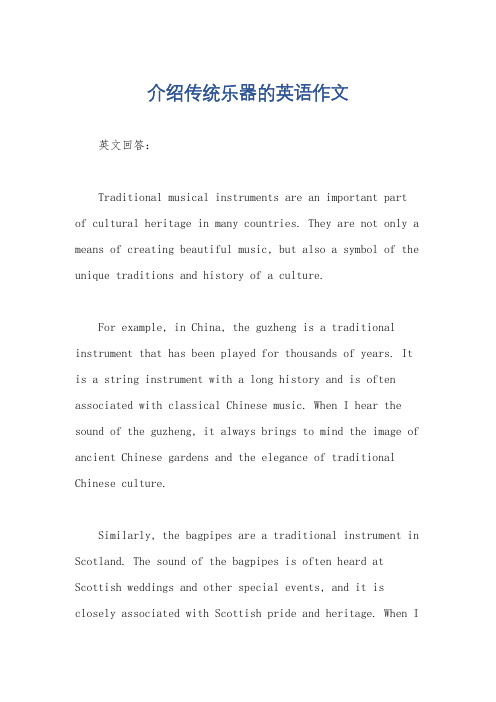
介绍传统乐器的英语作文英文回答:Traditional musical instruments are an important part of cultural heritage in many countries. They are not only a means of creating beautiful music, but also a symbol of the unique traditions and history of a culture.For example, in China, the guzheng is a traditional instrument that has been played for thousands of years. It is a string instrument with a long history and is often associated with classical Chinese music. When I hear the sound of the guzheng, it always brings to mind the image of ancient Chinese gardens and the elegance of traditional Chinese culture.Similarly, the bagpipes are a traditional instrument in Scotland. The sound of the bagpipes is often heard at Scottish weddings and other special events, and it is closely associated with Scottish pride and heritage. When Ihear the bagpipes, I can't help but feel a sense ofnostalgia for the beautiful Scottish countryside and the warmth of its people.中文回答:传统乐器是许多国家文化遗产的重要组成部分。
中国传统乐器英文介绍
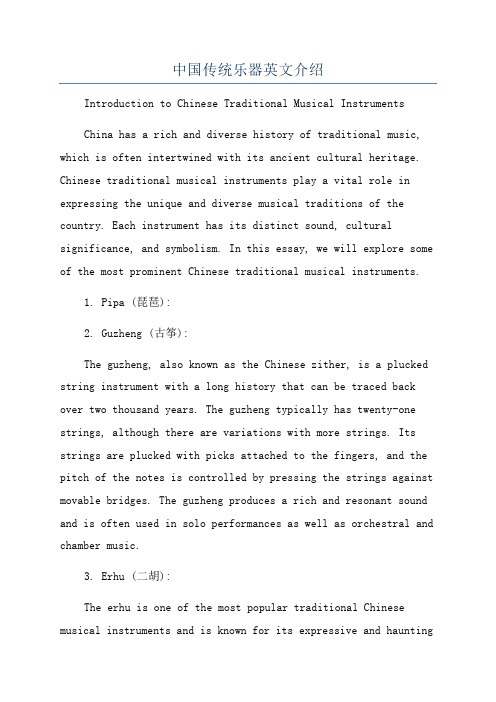
中国传统乐器英文介绍Introduction to Chinese Traditional Musical InstrumentsChina has a rich and diverse history of traditional music, which is often intertwined with its ancient cultural heritage. Chinese traditional musical instruments play a vital role in expressing the unique and diverse musical traditions of the country. Each instrument has its distinct sound, cultural significance, and symbolism. In this essay, we will explore some of the most prominent Chinese traditional musical instruments.1. Pipa (琵琶):2. Guzheng (古筝):The guzheng, also known as the Chinese zither, is a plucked string instrument with a long history that can be traced back over two thousand years. The guzheng typically has twenty-one strings, although there are variations with more strings. Its strings are plucked with picks attached to the fingers, and the pitch of the notes is controlled by pressing the strings against movable bridges. The guzheng produces a rich and resonant sound and is often used in solo performances as well as orchestral and chamber music.3. Erhu (二胡):The erhu is one of the most popular traditional Chinese musical instruments and is known for its expressive and hauntingsound. It is a two-stringed instrument played with a bow. The bow is unique as it is fitted with horsehair, which is tensioned by the player's fingers rather than a wooden stick. The erhu is often used in solo performances, as well as in both traditional and modern Chinese music.4. Dizi (笛子):5. Yangqin (扬琴):The yangqin is a hammered dulcimer that originated in China and has a history of over two thousand years. It consists of a trapezoidal wooden body with metal strings stretched across it. The strings are struck with a pair of bamboo or plastic hammers, and the pitch is determined by the length of the strings. The yangqin produces a bright and metallic sound and is often usedin traditional Chinese ensembles and orchestras.6. Sheng (笙):In addition to the above-mentioned instruments, there are numerous other Chinese traditional musical instruments such as the guqin, xiao, paigu, suona, and many more, each with its distinctive sound and cultural significance. These instruments continue to be an essential part of China's rich musical heritage, shaping and preserving its traditional culture for future generations.In conclusion, Chinese traditional musical instruments offer a glimpse into the country's rich cultural heritage. Each instrument carries its unique sound and symbolism, contributing to the diverse range of traditional Chinese music. Whether it's the delicate and expressive melodies of the pipa or the haunting and ethereal sound of the sheng, these instruments play an invaluable role in preserving and promoting China's traditional music.。
传统乐器介绍作文英文
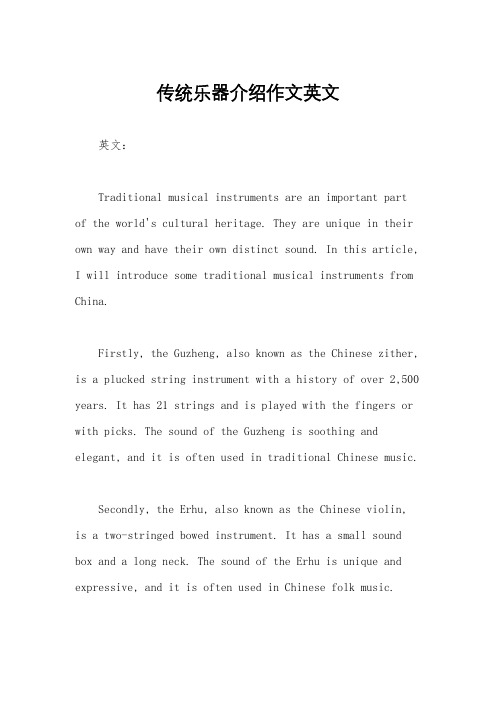
传统乐器介绍作文英文英文:Traditional musical instruments are an important part of the world's cultural heritage. They are unique in their own way and have their own distinct sound. In this article, I will introduce some traditional musical instruments from China.Firstly, the Guzheng, also known as the Chinese zither, is a plucked string instrument with a history of over 2,500 years. It has 21 strings and is played with the fingers or with picks. The sound of the Guzheng is soothing and elegant, and it is often used in traditional Chinese music.Secondly, the Erhu, also known as the Chinese violin,is a two-stringed bowed instrument. It has a small sound box and a long neck. The sound of the Erhu is unique and expressive, and it is often used in Chinese folk music.Lastly, the Pipa, also known as the Chinese lute, is a four-stringed plucked instrument. It has a pear-shaped body and a long neck. The sound of the Pipa is bright and crisp, and it is often used in Chinese classical music.These traditional musical instruments are not only a symbol of Chinese culture, but also a representation of the country's rich history and traditions.中文:传统乐器是世界文化遗产中重要的一部分。
关于中华传统乐器英文作文
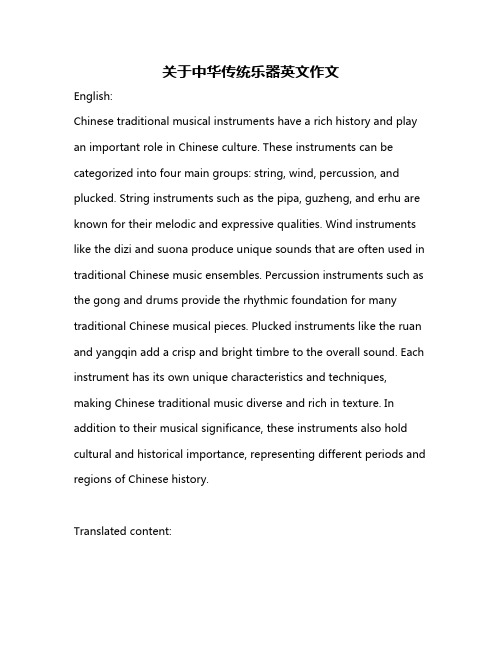
关于中华传统乐器英文作文English:Chinese traditional musical instruments have a rich history and play an important role in Chinese culture. These instruments can be categorized into four main groups: string, wind, percussion, and plucked. String instruments such as the pipa, guzheng, and erhu are known for their melodic and expressive qualities. Wind instruments like the dizi and suona produce unique sounds that are often used in traditional Chinese music ensembles. Percussion instruments such as the gong and drums provide the rhythmic foundation for many traditional Chinese musical pieces. Plucked instruments like the ruan and yangqin add a crisp and bright timbre to the overall sound. Each instrument has its own unique characteristics and techniques, making Chinese traditional music diverse and rich in texture. In addition to their musical significance, these instruments also hold cultural and historical importance, representing different periods and regions of Chinese history.Translated content:中国传统乐器拥有丰富的历史,对中国文化起着重要作用。
关于中华传统乐器英文作文

关于中华传统乐器英文作文Traditional Chinese Musical Instruments。
China has a rich cultural heritage, and one of the most significant aspects of this heritage is its traditional music. Traditional Chinese music is characterized by its unique melodies and the use of various musical instruments. In this article, we will explore some of the most well-known traditional Chinese musical instruments.1. Pipa。
The pipa is a four-stringed instrument that is played by plucking the strings with a pick. It has a pear-shaped wooden body with a long neck and 30 frets. The pipa has a history of over 2,000 years and is known for its expressive and melodic sound. It is often used to accompany solo performances, as well as in ensembles and orchestras.2. Guzheng。
The guzheng is a plucked zither with 21 strings. It has a long wooden body with movable bridges and is played by plucking the strings with the right hand and pressing the strings with the left hand. The guzheng has a wide range of tones and is capable of producing beautiful melodies. It is often used as a solo instrument and is a popular choice for both professional musicians and amateurs.3. Erhu。
中国乐器介绍英文作文
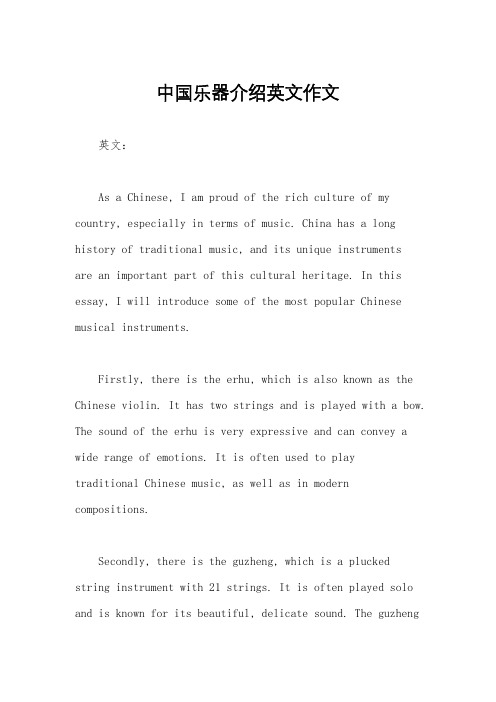
中国乐器介绍英文作文英文:As a Chinese, I am proud of the rich culture of my country, especially in terms of music. China has a long history of traditional music, and its unique instrumentsare an important part of this cultural heritage. In this essay, I will introduce some of the most popular Chinese musical instruments.Firstly, there is the erhu, which is also known as the Chinese violin. It has two strings and is played with a bow. The sound of the erhu is very expressive and can convey a wide range of emotions. It is often used to playtraditional Chinese music, as well as in modern compositions.Secondly, there is the guzheng, which is a pluckedstring instrument with 21 strings. It is often played solo and is known for its beautiful, delicate sound. The guzhenghas a long history in China, dating back to the Warring States period (475-221 BC).Another popular Chinese instrument is the pipa, which is a four-stringed lute. It is played by plucking the strings with a pick, and is known for its bright, crisp sound. The pipa is often used in Chinese orchestras, as well as in solo performances.Finally, there is the dizi, which is a bamboo flute. It is a simple instrument, but can produce a wide range of tones and is often used in traditional Chinese music. The dizi is also used in modern compositions and has been adapted for use in Western music.中文:作为一个中国人,我为我的国家的丰富文化感到自豪,特别是在音乐方面。
中国传统乐器讲座英语作文
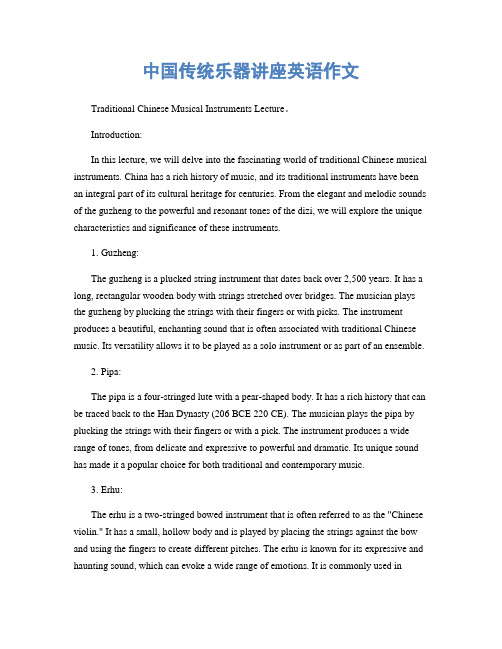
中国传统乐器讲座英语作文Traditional Chinese Musical Instruments Lecture。
Introduction:In this lecture, we will delve into the fascinating world of traditional Chinese musical instruments. China has a rich history of music, and its traditional instruments have been an integral part of its cultural heritage for centuries. From the elegant and melodic sounds of the guzheng to the powerful and resonant tones of the dizi, we will explore the unique characteristics and significance of these instruments.1. Guzheng:The guzheng is a plucked string instrument that dates back over 2,500 years. It has a long, rectangular wooden body with strings stretched over bridges. The musician plays the guzheng by plucking the strings with their fingers or with picks. The instrument produces a beautiful, enchanting sound that is often associated with traditional Chinese music. Its versatility allows it to be played as a solo instrument or as part of an ensemble.2. Pipa:The pipa is a four-stringed lute with a pear-shaped body. It has a rich history that can be traced back to the Han Dynasty (206 BCE 220 CE). The musician plays the pipa by plucking the strings with their fingers or with a pick. The instrument produces a wide range of tones, from delicate and expressive to powerful and dramatic. Its unique sound has made it a popular choice for both traditional and contemporary music.3. Erhu:The erhu is a two-stringed bowed instrument that is often referred to as the "Chinese violin." It has a small, hollow body and is played by placing the strings against the bow and using the fingers to create different pitches. The erhu is known for its expressive and haunting sound, which can evoke a wide range of emotions. It is commonly used intraditional Chinese music and has also found its way into various genres of music around the world.4. Dizi:The dizi is a bamboo flute with six finger holes and a mouthpiece made of bamboo or bone. It is one of the oldest Chinese instruments, with a history that can be traced back more than 7,000 years. The musician plays the dizi by blowing air into the mouthpiece and using their fingers to cover and uncover the finger holes. The instrument produces a bright and resonant sound that is often used to mimic the sounds of nature, such as birds and flowing water.5. Sheng:The sheng is a mouth-blown free reed instrument that consists of multiple pipes attached to a wind chamber. It is one of the oldest known Chinese instruments, with a history that can be traced back more than 3,000 years. The musician plays the sheng by blowing air into the mouthpiece and using their fingers to cover and uncover the pipes. The instrument produces a unique and vibrant sound that is often used in traditional Chinese orchestras.Conclusion:Traditional Chinese musical instruments are not only a source of pride for the Chinese people but also a window into the rich and diverse cultural heritage of China. The guzheng, pipa, erhu, dizi, and sheng are just a few examples of the many traditional instruments that have captivated audiences for centuries. Their unique sounds and expressive qualities continue to inspire musicians and listeners alike, bridging the gap between the past and the present. Through the exploration of these instruments, we gain a deeper understanding and appreciation for the beauty and complexity of Chinese music.。
英语介绍传统乐器作文初中
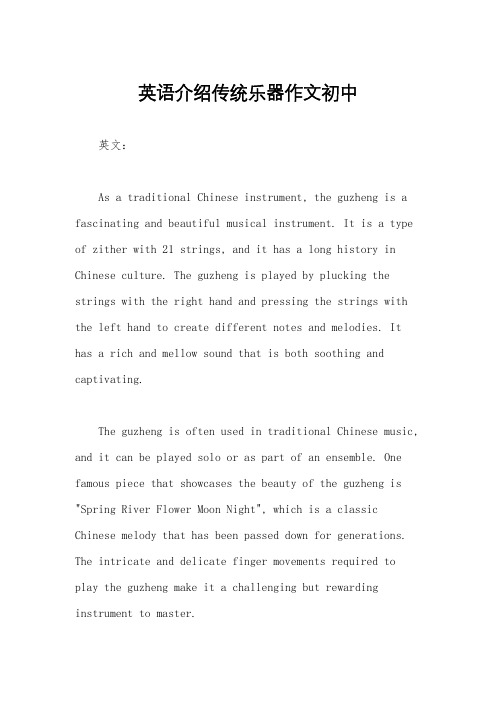
英语介绍传统乐器作文初中英文:As a traditional Chinese instrument, the guzheng is a fascinating and beautiful musical instrument. It is a type of zither with 21 strings, and it has a long history in Chinese culture. The guzheng is played by plucking the strings with the right hand and pressing the strings with the left hand to create different notes and melodies. It has a rich and mellow sound that is both soothing and captivating.The guzheng is often used in traditional Chinese music, and it can be played solo or as part of an ensemble. One famous piece that showcases the beauty of the guzheng is "Spring River Flower Moon Night", which is a classic Chinese melody that has been passed down for generations. The intricate and delicate finger movements required to play the guzheng make it a challenging but rewarding instrument to master.In addition to the guzheng, the erhu is another traditional Chinese instrument that has a unique and captivating sound. The erhu is a two-stringed bowed instrument, also known as the Chinese violin. It is played by sliding the bow across the strings, and the sound it produces is haunting and soulful. The erhu is often used to play traditional Chinese folk music, and it is also a popular instrument in contemporary Chinese music.One of the most famous pieces for the erhu is "The Butterfly Lovers", a beautiful and melancholic melody that tells the tragic love story of Liang Shanbo and Zhu Yingtai. The erhu's expressive and emotive sound makes it a powerful instrument for conveying deep emotions and storytelling through music.中文:作为传统的中国乐器,古筝是一种迷人而美丽的乐器。
跟交换生mike介绍中国传统乐器作文英语

跟交换生mike介绍中国传统乐器作文英语Introduction to Traditional Chinese Musical InstrumentsRecently, my exchange student, Mike, asked me about traditional Chinese musical instruments. As a music enthusiast, he was eager to learn more about the unique sounds and characteristics of these instruments. I was thrilled to introduce him to the rich and diverse world of Chinese music.First and foremost, I introduced Mike to the erhu, also known as the Chinese violin. The erhu is a two-stringed instrument played with a bow that is held between the strings, creating a hauntingly beautiful sound. Its expressive and emotive qualities have made it a popular instrument in traditional Chinese music and it is often used to play melody lines in solo performances or in ensembles.Next, I introduced Mike to the pipa, a four-stringed lute with a pear-shaped body. The pipa is known for its versatility and dynamic range, capable of producing both delicate melodies and powerful chords. It is often used in traditional Chinese opera, instrumental ensembles, and solo performances. Mike was fascinated by the intricate techniques used to play the pipa, including finger picking, strumming, and tremolo.I also introduced Mike to the guzheng, a long zither with 21 strings. The guzheng has a bright and resonant sound, with a playing technique that involves plucking the strings with the right hand while pressing them with the left hand to create melodic and harmonic sequences. Mike was impressed by the wide range of tones and textures that the guzheng could produce, from delicate harmonics to powerful bass notes.Finally, I introduced Mike to the dizi, a traditional Chinese bamboo flute. The dizi has a unique sound that is both airy and ethereal, with a tone that can range from soft and mellow to bright and piercing. Its versatile range makes it a popular instrument in traditional Chinese music, used in solo performances, ensembles, and orchestras. Mike was intrigued by the different playing techniques used to produce vibrato, trills, and glissandi on the dizi.Overall, I was delighted to introduce Mike to the beauty and complexity of traditional Chinese musical instruments. Through our exploration of the erhu, pipa, guzheng, and dizi, he gained a greater appreciation for the diversity and artistry of Chinese music. I look forward to continuing our musical journey together and discovering more about the rich heritage of traditional Chinese music.。
中国古典乐器—古筝琵琶英文介绍(带翻译)精讲
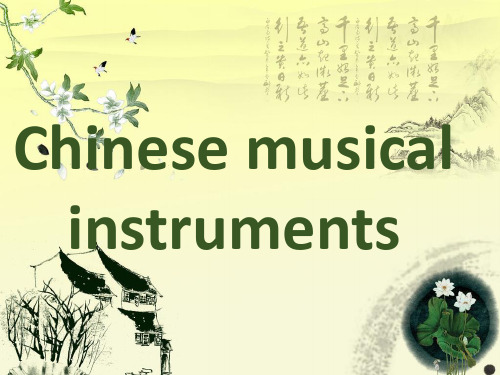
finger picks
zheng pronunciation of crisp, slender deep and bright, beautiful and gorgeous phonology, good performance to fill the gap mood and delicate and tactful mood, commonly used in solo, trio, singing accompaniment and instrumental ensemble zheng的发音素食,苗条深,明亮,美丽华丽的语音,良好 的表现填补了空隙的心情和精致的触觉心情,常用于独奏, 三重奏,唱歌伴奏和乐器合奏
Thanks
guzheng usually has 21 strings and bridges. It is 163 centimeters long. The picks (called "DaiMao") used by performers to play guzheng are often made out of the shells of hawksbill turtles. 古筝 通常有21个字符串和桥梁。 有 163长,演奏者用古筝演奏的笛 子(称为“黛ao”)通常由玳瑁龟 壳
琵琶是由“头”和“身体”组成,头 包括音箱,阶段等。 机身包括 音箱,相位等,十二音平均律由 六个音柱和二十四个音柱组成。 琵琶有四根弦,第一根是弦线, 另一根是钢丝绳处理尼龙。
4 chords
Pipa`s voice has strong penetrating. Treble District bright and full rigid, alto area soft and moisturizing tone, the bass sound sincere琵琶强穿透力(小 衰减,传播远而广)。 高音区 明亮而全硬,中音区柔软而保湿 的色调,低音音质真诚
- 1、下载文档前请自行甄别文档内容的完整性,平台不提供额外的编辑、内容补充、找答案等附加服务。
- 2、"仅部分预览"的文档,不可在线预览部分如存在完整性等问题,可反馈申请退款(可完整预览的文档不适用该条件!)。
- 3、如文档侵犯您的权益,请联系客服反馈,我们会尽快为您处理(人工客服工作时间:9:00-18:30)。
《战马奔腾》
Bow弓 (made of bamboo)
Bridge 琴码 Sponge 音垫
Horsetail
Internal string内弦 External string外弦
Forepart
Midportion Back end
Numbered musical notation and Staff
Erhu
The erhu (Chinese: 二胡; pinyin: ârhú), also called nanhu (南胡, "southern fiddle"), and sometimes known in the West as the "Chinese violin" or "Chinese two-string fiddle," is a twostringed bowed musical instrument, used as a solo instrument as well as in small ensembles and large orchestras. It is the most popular instrument in the huqin family of Chinese bowed string instruments, together with the zhonghu, gaohu, banhu, jinghu, sihu, and numerous others. Used in both traditional and contemporary pieces, it is a versatile instrument.
Erhu can not only express mourning or depressed emotion ,but also can produce delighted ,excited,smooth and
lively melody.
Some famous compositions of Erhu:
The southern spring 《江南春色》
The moon reflected in two springs 《二泉映月》
Sunshine in the skies of Tashkurghan
《阳光照耀着塔什库尔干》
A spray of flowers
《一枝花》
Galloping horses
Banhu 板胡
Gentle , sorrowful
Bright ,painful
Gehu 革胡
Zhonghu 中胡
Jinghu京胡
Percussion Instruments (打击乐器)
Luo/Chinese Gong 锣
Chinese Wood Block 木鱼
Wind Instruments (吹管乐器)
Sheng 笙
Di/Chinese Bamboo Flute 笛
Hulusi葫芦丝
Ease of learning, portability and inexpensiveness. It is a unique solo instrument and also be used in wind band.
China national Musical Instruments
Plucked Instruments (弹拨乐器)
Guzheng/ Chinese Zither 古筝
Pipa/Chinese Lute 琵琶
String Instruments (拉弦乐器 )
Erhu /Chinese Fiddle 二胡
Why it is called Erhu
The first Chinese character of the name of the instrument (二, èr, two) is believed to come from the fact that it has two strings. An alternate explanation states that it comes from the fact that it is the second highest huqin in pitch to the gaohu in the modern Chinese orchestra. The second character (胡, hú) indicates that it is a member of the huqin family. The name huqin literally means "barbarian instrument," showing that the instrument likely originated from regions to the north or west of China inhabited by non-Han peoples.
